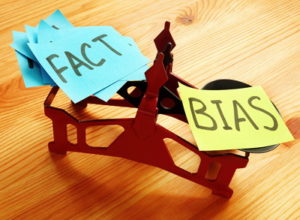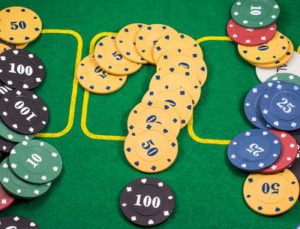 Unless you are extremely naïve, the chances are high that you will know that betting companies use psychological tricks to get you to use their services. Even once they’ve got you as a customer they keep them going, promising free bets if you spend a certain amount of money in a given period of time, for example. Adverts that say that betting is as much about gut instinct as it is about skill can give a false impression to people who don’t know that really the only things that can stand you in good stead are research and being objective and even they aren’t failsafe.
Unless you are extremely naïve, the chances are high that you will know that betting companies use psychological tricks to get you to use their services. Even once they’ve got you as a customer they keep them going, promising free bets if you spend a certain amount of money in a given period of time, for example. Adverts that say that betting is as much about gut instinct as it is about skill can give a false impression to people who don’t know that really the only things that can stand you in good stead are research and being objective and even they aren’t failsafe.
Betting companies use all sorts of different psychological tricks to both win customers in the first place and then keep them in place once they’ve got them. They need to do what they can to set themselves apart from the crowd in a busy marketplace, so finding psychological hooks with which to engage their punters is key to managing that. Given that British bettors spend more than £15 billion per year on gambling, it is fair to say that whatever methods the companies use are working well. The question is, what are they?
It Starts With Advertising
 Most people in the United Kingdom will, at the very least, have heard of a bookmaker or a betting company. Even those that don’t like to gamble will know about how it works are a process, yet even those that don’t are likely to have seen a television advert inviting them to place a bet or two at some point or another. Even if you haven’t seen an advert on the tele then the chances of you not coming across a gambling advertisement on the radio, via social media or thanks to sponsorship of a football team or sports event are slim.
Most people in the United Kingdom will, at the very least, have heard of a bookmaker or a betting company. Even those that don’t like to gamble will know about how it works are a process, yet even those that don’t are likely to have seen a television advert inviting them to place a bet or two at some point or another. Even if you haven’t seen an advert on the tele then the chances of you not coming across a gambling advertisement on the radio, via social media or thanks to sponsorship of a football team or sports event are slim.
Unlike most adverts, which tend to be showing off a product that you either already know or can easily understand what it does, gambling adverts have to try to persuade people that haven’t placed a bet before, or who don’t do so very often, to engage in the activity more regularly. This is when the first psychological trick comes into play, hinting to people that they can win money if they place a bet or two, even though the reality is that you will almost certainly lose money over time. They need to convince you of something that isn’t true.
Whether it is the sight of Ray Winstone popping up and telling you to place a bet before informing you to do so responsibly, even though the company that he works for definitely doesn’t want you to do that, or it is some sort of elaborate advert that seemingly puts an internal dialogue on screen before declaring that instinct is the key to winning, betting adverts target audiences in specific ways. They will usually offer the impression that you’re in control when the reality is that most people aren’t; a major problem when it comes to young bettors.
Understanding Cognitive Biases
 What bookmakers are brilliant at is understanding how to target our cognitive biases. Humans tend to misjudge situations based on a flawed perception of what is going on, so people that support a certain football team or love a particular tennis player, say, will believe that a gut feeling that they have about the result of a match is more true to life than it actually is. Sometimes this will cause people to believe that their team will win a match they have no chance of winning or, for reasons of superstition, that they’ll lose a match they were always going to win, incorrectly betting accordingly.
What bookmakers are brilliant at is understanding how to target our cognitive biases. Humans tend to misjudge situations based on a flawed perception of what is going on, so people that support a certain football team or love a particular tennis player, say, will believe that a gut feeling that they have about the result of a match is more true to life than it actually is. Sometimes this will cause people to believe that their team will win a match they have no chance of winning or, for reasons of superstition, that they’ll lose a match they were always going to win, incorrectly betting accordingly.
It is not just sports where that sort of thing happens. The odds of winning the National Lottery are so slim as to be basically non-existent, yet we still play it. Similarly, people spend huge amounts of money trying to trigger a slot machine’s jackpot that will almost certainly never happen. We do it because we believe that fate will intervene on our behalf, in spite of the completely irrational nature of such a belief. The reality is that the nature of probability means that the games will defeat our irrational mind every time, but by persuading us that we stand a chance against all odds, betting companies persuade us to play.
The founder of the poker game firm Aftermath Interactive, Kim Lund, summed it up, saying,
“All gambling games are based on psychological triggers that mean they work. The human brain is incapable of dealing with randomness. We’re obsessed with finding patterns in things because that prevents us from going insane. We want to make sense of things.”
In other words, we will keep on betting and trying to win because we believe that there is a pattern to be found and at some we’ll stumble across it, with randomness not really part of the process in our minds.
The Bets That Pique Our Interest
 How many times have you been walking down a street and seen a sign on a high street bookmaker’s shop saying something along the lines of “Everton to win 3-1, Anthony Gordon to score first: 15/1”. On the face of it, it looks like a good deal given the lengthy odds that you’re being offered. When you begin to break it down, however, you will soon realise that it isn’t that good a deal. For starters, Everton aren’t very good (at least at the time of writing), so the chances of them winning at all are slim. The fact that you also need to get the Correct Score and the First Goalscorer makes it an even more difficult bet to come in.
How many times have you been walking down a street and seen a sign on a high street bookmaker’s shop saying something along the lines of “Everton to win 3-1, Anthony Gordon to score first: 15/1”. On the face of it, it looks like a good deal given the lengthy odds that you’re being offered. When you begin to break it down, however, you will soon realise that it isn’t that good a deal. For starters, Everton aren’t very good (at least at the time of writing), so the chances of them winning at all are slim. The fact that you also need to get the Correct Score and the First Goalscorer makes it an even more difficult bet to come in.
The odds are more likely to be something like 70/1, but bookies know that they can offer significantly lower odds than that and still get a good chunk of customers because it looks like a good offer. What the bookmakers have at their disposal is a wealth of historical information that tells them that that outcome is extremely unlikely to happen. Normal punters don’t have that to hand and most won’t bother to do any research, instead seeing an offer for a good player to score a goal in what looks like a routine win when it’s actually anything but.
The Representativeness Heuristic
 Gambling companies push the types of bets that they believe most laypeople will take them up on, with the tendency of many being to gamble money on more complex bets than simpler ones. Anthony Gordon as Anytime Goalscorer at 5/2 is a much less appealing bet, even though it has a much greater chance of actually happening, for example. This is a representativeness heuristic, which is a rule of thumb that you use in everyday life that tends to work pretty well most of the time, but can convince you to make a bad mistake when it is deliberately exploited.
Gambling companies push the types of bets that they believe most laypeople will take them up on, with the tendency of many being to gamble money on more complex bets than simpler ones. Anthony Gordon as Anytime Goalscorer at 5/2 is a much less appealing bet, even though it has a much greater chance of actually happening, for example. This is a representativeness heuristic, which is a rule of thumb that you use in everyday life that tends to work pretty well most of the time, but can convince you to make a bad mistake when it is deliberately exploited.
If you can easily imagine something happening, as in the case of the football bet, then the chances are that you’ll use that representativeness heuristic to decide it is a good bet to place. The fact that numerous different factors need to happen at the same time means that it’s unlikely to happen, but your brain ignores that. Gambling companies know that we do it, so they removed the Home Win, Away Win, Draw betting adverts used in the 2014 World Cup by the time that the 2018 World Cup came around, replacing them with more complex bets that had less chance of succeeding.
They’ve Got You, How Do They Keep You Hooked?

Once gambling firms have managed to convince you to bet with them, their next job is to make sure that it isn’t a short-term thing. Instead, they want to keep your around for as long as possible, largely because the House Edge and other gambling tools are based on a long period of time. The first thing that they need to do is to make you feel as if you’re in control. Psychologists have noted that dice players tend to throw the dice hard when they want to hit a high number and soft when they want a low one, trying to take some control over something that is entirely random.
In 1975, Ellen J Langer wrote a paper called The Illusion Of Control, in which she posited that our expectations of what will happen in a game of chance will vary depending on a number of factors that we actually have no control over. Dr Steve Sharman from the School of Psychology at the University of East London pointed to the fact that roulette tables will often show you a list of the numbers that have recently landed, perhaps suggest some are ‘hot’ and others ‘cold’. The idea is that you will believe that previous spins of the wheel will have an effect on the outcome of future spins, when in reality they don’t.
As human beings, we want to believe that we have control over something that is actually entirely down to chance. Bookmakers and gambling sites that are able to find ways of giving us this sense of control can keep us hooked to playing with them for longer. Another thing that they do is disguising our losses as wins. This is something that the United Kingdom Gambling Commission is trying to crack down on, stopping companies from putting up flashing lights and noises when a £1 bet has ‘won’ you 20p, making you feel like it’s a winner when actually you’ve lost 80p.
It is similar to how slot machines will give customers a sense that they’ve had a near miss on a game. If you’ve ever played on a slot that offers a jackpot if you hit a certain number of symbols in a row, you will doubtless have experienced it when you’ve hit the symbol, say, four times, so the last reel lights up and spins around and around building up tension. It doesn’t land, but it makes you feel as though you had a near miss and if you just keep playing it’s bound to land for you sooner or later, isn’t it? No, but that feeling keeps you coming back for more.
Another trick employed by betting companies is to give you ‘free money’. Whether it be free bet tokens as part of a promotion or a free bet once you’ve spend a certain amount of money, it acts as a motivating factor to keep you returning time and again. Certainly loyalty clubs work in an obvious way, but the likes of Odds Boosts also do the same job of making it seem as if you’re getting something for nothing. People are generally happier to bet with money that they’ve won or been given than with money that they paid in themselves, so the company knows it is likely to get it all back eventually anyway.
Is It Right Or Fair?
 The obvious question to ask is whether it is right or fair for gambling companies to use such psychological techniques to get people to place bets and then keep on placing them. It is not an easy question to answer, with many companies using similar such physiological tricks to persuade people to buy their product over a competing one. The problem when it comes to gambling is that it feels like a much more distasteful activity than, say, eating junk food or buying a car. Both of those products have adverts and methods that trick you into buying them.
The obvious question to ask is whether it is right or fair for gambling companies to use such psychological techniques to get people to place bets and then keep on placing them. It is not an easy question to answer, with many companies using similar such physiological tricks to persuade people to buy their product over a competing one. The problem when it comes to gambling is that it feels like a much more distasteful activity than, say, eating junk food or buying a car. Both of those products have adverts and methods that trick you into buying them.
The key isn’t so much to complain that gambling companies use these methods to entice us to bet, but is instead to realise that they’re doing it and to find ways to stop ourselves from falling for them. When you play a slot game, have a pad of paper and a pen and write down your running total of losses so you don’t fall for tricks that make you feel like you’re winning when you’re not. When you’re offered a Scorecast bet, look at the individual odds for each outcome and ask if the accumulator odds being offered are fair. Keep an eye out for the tricks and you might just be able to beat them.
